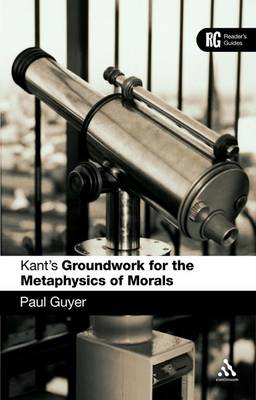A Reader's Guides
1 total work
Kant is probably the philosopher who best typifies the thought and ideals of the Enlightenment. He was influenced by the modern physics of Newton, the rationalist perfectionism of Leibniz and Wolff, the critical empiricism of Locke and Hume, and Rousseau's celebration of liberty and individualism, and his work can be seen partly as an attempt to combine and synthesize these various ideas. In moral philosophy, he developed a radical and radically new conception of the unconditional value of human autonomy, which he opposed to both theological and utilitarian conceptions of moral value. He first expounded his moral vision in the "Groundwork for the Metaphysics of Morals" (1785), the seminal work of modern moral philosophy in which he introduced his infamous 'categorical imperative'. Paul Guyer's Reader's Guide will help readers find their way in this brilliant but dense and sometimes baffling work.
